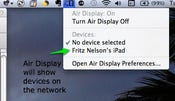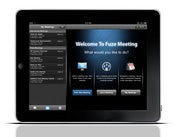Apple iOS 4.2 For iPad Reviewed
AirPlay, AirPrint, folders and multitasking come to the iPad with Apple's latest software update, but is it the enterprise tablet we've been waiting for? Here we put it through the paces to find out.

Slideshow: The 18 Best iPad Apps For SMBs |
|---|
iOS 4 was first offered for the iPhone 4, iPhone 3GS and iPhone 3G earlier this year. The big new features for iOS 4 were the addition of folders, multitasking and a unified inbox for the email program. The iPad, however, wasn't party to the iOS 4 update and has been stuck on iOS 3.2.2 for months without access to these features.
Last month, Apple finally made iOS 4.2 available to the iPad for the first time. The update installs a bevy of new features above and beyond folders and multitasking for iPad users to get excited about. After spending a week with the new system software, InformationWeek shares its thoughts about the iPad's renewed productivity possibilities.
Multitasking and Folders
As on the iPhone with iOS 4.x, double-tapping the home button of the iPad brings up a list of open apps that users can jump to quickly. The sliding dock that appears on the bottom of the screen can be slid to the left or right. To the left, users find easy access to brightness, screen orientation, media player, AirPlay and volume controls. Sliding the dock to the right reveals a string of the most recently used applications. This dock is accessible from most applications on the iPad and is the best way to jump between active applications.
The most important aspect of iOS 4.2's multitasking ability is that the iPad preserves the "state" in which you leave apps. In other words, if you've started typing an email, and jump to the browser, you won't lose your spot in the email when you return. In practice, this works just as Apple describes and is especially helpful in the browser. Using the multitasking tool prevents the browser from refreshing the current web page, which means users can pick up right where they left off.

Slideshow: 10 Killer Mac Applications
Slideshow: iPad Does Remote Control--3 Apps Tested (click image for larger view and for full slideshow)
Folders for the iPad work almost identically to the way they do for the iPhone. Folders can be created directly on the iPad or through iTunes. The iPad ups the number of apps per folder to a maximum of 20, compared to the iPhone's 12. Tap the folder, and a window drops down to show the apps stored inside. Drag-and-drop one app on top of another to start building a folder. If the apps share the same category in the App Store (e.g., "games"), the iPad will automatically name the folder "Games." Users can name folders anything they want.
While folders aren't the biggest improvement in the world, it does help reduce the number of active home screens. I was able to reduce the six home screens I had down to a more manageable two. Multitasking is the better of these two improvements, and is greatly appreciated.
AirPlay
AirPlay is Apple's proprietary version of DLNA (Digital Living Network Alliance) technology. Essentially, it allows the iPad to wirelessly stream multimedia content -- including music, HD movies and photos -- via Wi-Fi to other supported devices. When I say "other supported devices" I really mean the new Apple TV and Apple's Airport Express.
This feature works perfectly. With the new Apply TV, I was easily able to stream 720p HD movies to my HDTV with a few taps of the finger. It's simple, quick, and just works. As for quality, I couldn't see a difference between playback via AirPlay or playback of a file streamed via my wired network. Picture quality looked spot on, and the 5.1 digital audio track came through just fine.

Fuze Takes Meetings To iPad
(click image for larger view)
Slideshow: Fuze Takes Meetings To iPad
Previously, if you wanted to play content from an iOS device on an HDTV, you had to use a $49 cable from Apple to plug into the TV. The new Apple TV costs $99, and is easily worth it when you consider the AirPlay features of the iPad with iOS 4.2. I do wish, however, that AirPlay would be compatible with non-Apple hardware.
AirPrint
Another of iOS 4.2's novel features for the iPad is the ability to print wirelessly -- though there are limitations. AirPrint uses Wi-Fi to find and locate printers that are connected to the same Wi-Fi network. As long as the printer is officially supported, the feature works flawlessly.
Through sheer dumb luck, I have an HP Photosmart Premium C410, which makes the AirPrint cut. After connecting the C410 to my Wi-Fi network, the iPad spotted it and was able to print to it. Pretty much anything can be printed from the iPad, including emails, photos and websites. Once a file is sent to the printer for printing, the iPad can resume other tasks while the document is printed in the background.
The problem is the number of compatible printers is ludicrously small. Just 12 printers are supported, and, according to Apple's website, all of them are consumer or small-office/home-office types made by HP. Apple needs to work with printer makers to expand this feature's compatibility. Notably absent? Business grade printers of any kind. (Users of Apple computers can, however, download and run a program called AirPrint Hacktivator to circumvent Apple's limitations.)
Find My iPad
Apple has wisely decided to make its device-locating feature free (it previously required a $100-per-year MobileMe account). Find My iPad lets any iPad user locate their device via a web browser.
First, the Find My iPad application needs to be downloaded and installed on the iPad. It is free from the iTunes App Store. Once installed, users will be prompted to register their Apple ID (used for iTunes Store access) with Apple's MobileMe service. If they don't already have an Apple ID, users can create one on the spot. With the application installed and registered, the iPad is ready to be found.
Slideshow: The 18 Best iPad Apps For SMBs |
|---|
If the device becomes lost, users can go to me.com, enter their Apple ID, and the software automatically find the associated iPad (or iPhone). It brings up the device's location on a map, making it a cinch to get directions to wherever the device may have been left. Additionally, Apple offers iPad users the same security features that are available for the iPhone. The iPad can be remotely locked or wiped. It can be made to issue an alert or sound, so it is more easily found. Or it can be set to display a message like "Help, I'm lost!"
As for accuracy, even though I have a Wi-Fi-only version of the iPad, Find My iPad was able to locate it to within about 10 -15 feet. That's pretty impressive. Models that have the 3G/GPS radios on board should see better results than that.
Game Center
The iPad gains access to Apple's Game Center with iOS 4.2. The Game Center is Apple's social/multi-player gaming platform, and works between all iOS 4.2 devices (iPad, iPhone and iPod Touch). Once signed in with their Apple ID, users can locate friends, pick a game and get the action rolling.
Games are plentiful, and (probably) too easy to download. Users can invite friends to join a game via nickname or email address, as well as see what games they've tackled lately. The leaderboard feature also lets users compare scores and achievements. That can be good or bad, depending on how solid a gamer you are.
Other Improvements
From an enterprise perspective, the iOS 4.2 for the iPad doesn't make many dramatic improvements over iOS 3.2.2. The most notable and obvious changes have been made to the email program.

Fuze Takes Meetings To iPad
(click image for larger view)
Slideshow: Fuze Takes Meetings To iPad
With iOS 4.2, the iPad now supports threaded email and a unified inbox. Similar to Gmail, threaded email on the iPad lets users group received emails into a conversational format. You can then scroll through each individually, in order. The biggest problem is that it can require more clicks, and doesn't add the emails you have sent into the conversation. The result is a one-sided email conversation that doesn't compete with the threaded email Google offers to Android devices. (In fact, serious Gmail users will be better off to use the browser-based version of Gmail, which Google has given amazing capabilities through the use of HTML5.)
The unified inbox will lump all the email from each email account on the iPad into one master inbox. This makes it easier to scan through multiple accounts at once. Another bonus is the ability to sync notes between the iPad and your email. The option to do so is found in Apple's iTunes software.
The iPad also has the improved spell check software. The software offers several options when it can't figure out what a user is attempting to type. Giving users this extra choice leads to fewer corrections later.
The Verdict
There's no doubt that iOS 4.2 greatly improves the functionality of the iPad. The addition of folders, multitasking and refreshed email all go a long way toward making the iPad a more robust device. AirPlay, AirPrint, Find My iPad and the Game Center take the iPad to the next level, making it genuinely fun to use. While each of the new features isn't perfect and has limitations, the utility of things such as wireless printing and locating a lost iPad can't be debated.
iOS 4.2 doesn't give the iPad Flash. It also doesn't give it video chat capabilities. Limitations of the iPad aside, unless you absolutely have to run the iPad jailbroken/unlocked, there's no reason to skip iOS 4.2.1. It takes what was a really good device and makes it truly great.
SEE ALSO:
Apple Seen Prepping Thinner iPad For 2011
Kindle Rapidly Losing Share To iPad
About the Author
You May Also Like






